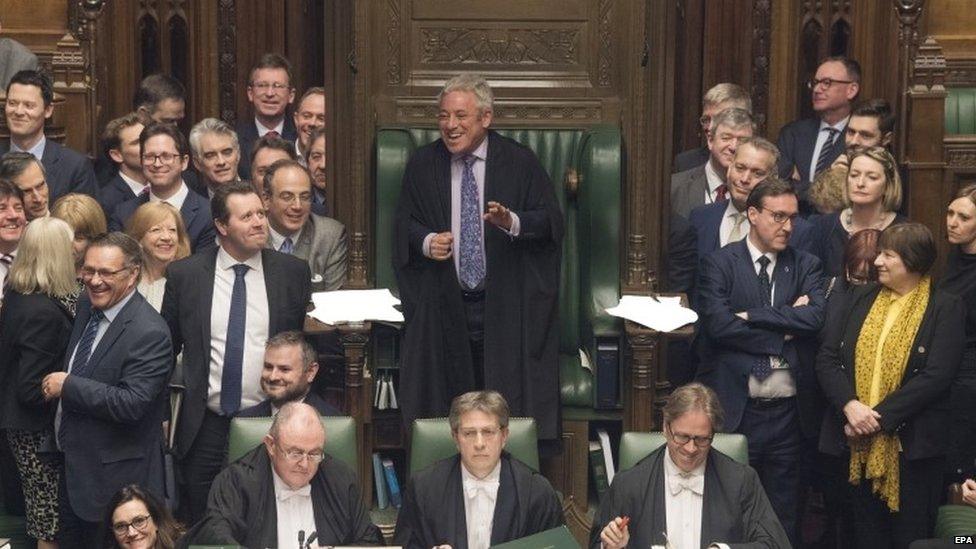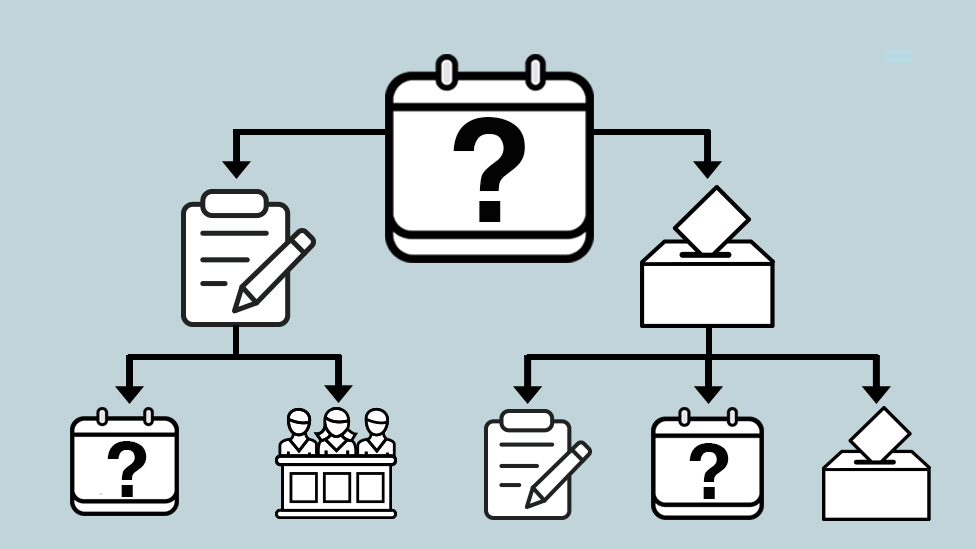John Bercow's historic legacy as Speaker
- Published

So farewell then. John Bercow.
He has been that rare thing - a historically significant Speaker of the Commons, making rulings that have genuinely altered the course of events, and dramatically altering the public face of Parliament.
It is taken for granted, now, that MPs will usually debate great events as they occur, through the device of Urgent Questions, but it was not always so.
His predecessor, Speaker Martin, hardly ever allowed UQs, while Speaker Bercow often managed several a day.
The effect was that ministers and MPs could be seen talking about major questions, rather than appearing to ignore them.
At a stroke, Parliament was part of a news agenda - and as Brexit unfolded, there was a considerable news agenda to be part of.
Then there were those key rulings - allowing an extra amendment to the 2013 Queen's Speech gave backbench Tory Brexiteers a chance to express their disappointment that there was no EU referendum in the proposals.
This gave parliamentary expression to a major current of public opinion, and started the process of cornering David Cameron into a genuine commitment to a referendum.
By the end of the coalition years the Speaker had become a serious thorn in the government's flesh - he had a spectacular public shouting match with the then Chief Whip, Patrick McLoughlin, on the floor of the Commons, amongst other incidents.
He had regular spats with ministers - his put-down to Tim Loughton: "The children's minister should not be acting like a child," was the kind of sharp-tongued rebuke that led to Conservatives sporting "BBB" badges. BBB? - "Bollocked by Bercow".
A number of MPs - including James Duddridge and Andrew Bridgen - continued a low-level guerrilla campaign against him, although it never gained much traction.
Coup attempt
Relations had deteriorated to the extent that the then government organised a last-day coup to bring in a secret ballot of MPs for the re-election of the Speaker after the 2015 election.
The theory was that a secret ballot would make it easier to remove him, because it would embolden MPs afraid of openly voting against him, who would face some revenge if the effort failed.
In full: Speaker Bercow announces resignation
After an emotional debate the move was defeated - which was to have huge implications after the Brexit referendum.
The Speaker insisted that the device of a "humble address" to obtain the publication of government documents, had to be respected.
Later he ruled that Theresa May's government could not keep bringing back its Withdrawal Agreement, unchanged, in repeated attempts to seek MPs' approval.
And later still, he allowed amendments to be made to the agenda of the Commons, allowing backbench MPs to seize control of from the government and ram through legislation.
Procedural innovation
Most recently he allowed emergency motions to go beyond the normal bland formulation that the House had discussed some matter, paving the way for the critical Benn-Burt Bill (now an Act of Parliament) to prevent a no-deal exit from the EU.
Time and again his procedural rulings have given a Commons majority real leverage over the course of events, to the open fury of ministers.
His relationship with the former Leader of the House, Andrea Leadsom, was particularly icy, and it was no surprise to see her being quoted in the Sunday papers announcing that the Conservatives would run an election candidate against the Speaker in his Buckingham seat.
I'm inclined to doubt that this forced Mr Bercow into announcing his departure date; although he will probably be annoyed that it may now appear that way.
After 10 years in the Chair (and he pledged to serve no more than nine years when he was running for the speakership, back in 2009) he was already on the glide path to retirement.
The scenes after he made the announcement were telling. Almost all the opposition side of the Commons rose to applaud him; far fewer rose on the government side, but their number included the whipless Tory rebels.
Partisan
The truth is that John Bercow had become what Speakers should not become - a partisan figure, whose rulings were perceived as partisan.
Many wise old hands believe he has already damaged the office of Speaker, and were beginning to fear that a longer tenure would make that damage irreparable.
Few of those anxieties seeped out in the long tribute session that followed the Speaker's announcement, and nor did anyone mention the bullying allegations against him, personally, which he denies.
Instead MPs focussed on modernising initiatives like the Commons crèche and the decision to allow parents to enter the voting lobbies carrying small children - he also took a share of the credit for the decision to allow proxy voting for pregnant MPs and new mothers.
And there was also much praise for his reaction to the 2016 murder of the Labour MP Jo Cox, travelling to her constituency.
The succession
So what of the future? The front runner for the succession is Sir Lindsay Hoyle, the Chairman of Ways and Means, the senior deputy speaker.
He is a much more traditional figure than John Bercow, but he has won good reviews for his role in dealing with MPs' concerns about their personal security.
Another of Mr Bercow's deputies, Conservative Eleanor Laing, has entered the contest although it is not clear whether Dame Rosie Winterton will join her.
There will certainly be other candidates, including former shadow leader of the House Chris Bryant, veteran Conservative Sir Edward Leigh and - possibly - the chair of the Commons Public Accounts Committee, Meg Hillier. SNP shadow leader, Pete Wishart has also shown an interest
Whoever wins will have to decide how to approach the process of change in an only partially-modernised parliament.
And also to cope with a Commons that has become used to exerting real power over government and which rather enjoys the experience - and which would resist any attempt to put it back in its box.
But that future will not start until 31 October. Speaker Bercow will remain in the chair until the next Brexit crisis is done, and the UK has either left or extended its membership once again.
So he will be in the chair if MPs seek to take further measures to rein in a defiant prime minister.
It could be a dramatic final act to a speakership that sometimes seemed to have been scripted by Quentin Tarantino.
- Published13 July 2020

